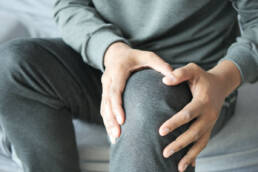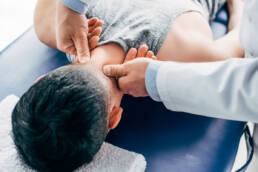Your body simply cannot function properly without keeping your spine in good health. Comprised of a series of discs and vertebrae, it’s essentially one massive joint, and needs to continue maintaining flexibility.
One of the most common back issues people experience is a herniated disc, which happens when the disc comes out of place and presses against the sciatic nerve. According to StatPearls, as many as 2% of adults experience some form of herniated disc throughout their life. That’s enough that almost everyone knows someone who has experienced this condition.
Symptoms range from pain in the upper and lower backs to peripheral numbness and referred pain. It can become excruciating in later stages, inhibiting your ability to perform day-to-day functions. That’s why it’s important to act quickly if you suspect you have a disc herniation, potentially avoiding the more invasive forms of treatment. Consider the various treatments available, and how to determine which is appropriate for your particular circumstance.
1. Pain Management
According to Dr. Howard S. An, director of the Spine Fellowship Program at Rush University Medical Center, between 80%-90% of herniated disc patients can recover completely without surgical intervention. The first line of treatment is often an assortment of medications to help relieve symptoms, which can encourage healing.
Anti-Inflammatory Medications
Anti-inflammatory medications are often a first-line treatment for herniated discs. This includes OTC medications, or over-the-counter, known as non-steroidal anti-inflammatory drugs, or NSAIDs, and include medications like ibuprofen. Check with your doctor before starting a new medication, as some may be hard on your liver with prolonged use. You may want to avoid using certain medications if you have other health conditions.
Pain Medications
In addition to anti-inflammatory medications, your doctor may recommend some non-narcotic pain medications, known as analgesics. These can help make you more comfortable, allowing you to continue some of your normal daily activities. However, even if your back is feeling better due to medications, you’ll want to avoid major strain to give it time to heal. Again, work with your doctor to find the best pain medications for your particular situation.
Steroid Shots
In some cases, your doctor may recommend steroid injections, sometimes referred to as cortisone shots. These are administered by your doctor directly into your back, and provide longer-lasting inflammation control than oral medications.
2. Alternative Treatments
In addition to medications, there are a series of what are commonly referred to as alternative treatments. These may include physical therapy, chiropractic, acupuncture, and massage.
Chiropractic Care
Chiropractic care is often one of the primary treatments sought by people wishing to avoid surgical intervention. The goal of chiropractic care is to draw the disc away from the sciatic nerve, relieving the pressure that’s responsible for your discomfort.
Your chiropractor will first evaluate your situation and ensure you are a good candidate for spinal manipulation. Once they deem that your situation is safe to perform adjustments, they employ several techniques to provide relief.
The most widely used is the Flexion-Distraction technique. This uses a specialized table that gently flexes your pelvis up and down with the help of the chiropractor, relieving the pressure on the problematic disc. Often, it’s unusual pressure that causes discs to slip out of place in the first place.
The other method is called Pelvic Blocking, where the chiropractor uses specialized foam blocks behind your legs and under your pelvis. This also helps relieve the pressure on the problematic discs.
Ultimately, your chiropractic care aims to accomplish two things. First, you should experience some rapid pain relief from the adjustment. Second, it puts your spine back into a condition that encourages healing. Keep in mind that you will likely need multiple adjustments throughout the healing process to see complete or near-complete recovery.
Physical Therapy
Physical therapy works alongside chiropractic care. Where chiropractic works to adjust your spine, physical therapy aims to strengthen the muscles around your spine. This helps keep your adjustments in place and ultimately helps prevent recurrent herniation.
Acupuncture
While acupuncture may not help put your disc back in place, it certainly has an effect on your treatment. It’s long been studied and observed that acupuncture can help relieve pain associated with herniated discs. It does this by releasing endorphins into the blood system that help reduce pain throughout the body. Make sure you see a properly qualified and licensed acupuncturist to have this procedure performed safely.
Massage
Deep tissue massage also plays an important role in your recovery and can make adjustments easier and more effective. When your spine is injured, the muscles around that area lock up to prevent further injury, like a muscular splint. Deep tissue massage works to relieve muscle tension and spasms, allowing your spine easier movement and manipulation.
3. Surgical Treatment
The final course of treatment is surgical intervention with an orthopedic surgeon. There are now several surgical options available, depending on the particulars of your condition. These may include anything from a laminotomy to relieve the pressure on the nerve roots to a discectomy, where they’ll remove part of the disc that’s out of place. In more significant cases, the surgeon may recommend a disc replacement or spinal fusion surgery.
Finding The Right Treatment for You
While it would be great to just look at the options and decide which one you want to try, it’s a little more complicated. You may not be a good candidate for all options, depending on the severity of your herniation. Work with your doctor to evaluate your condition, which may include tests like an X-ray, CT scan, or even an MRI. Once you know the results, consult a trusted chiropractor to determine what kinds of chiropractic treatment may be appropriate for your case.

Ready for an expert opinion? Get in touch today!
Chiropractic care in Redmond offers a holistic approach to health and well-being. Through gentle adjustments, personalized treatment plans, and patient education, chiropractors aim to improve spinal alignment, relieve pain, enhance performance, and promote overall wellness.
Like this article? Spread the word!
Related Posts
February 16, 2023
Chiropractic Care Hastens Recovery After Car Accident
Chiropractic services are often the best way for people to deal with minor to moderate…
January 25, 2023
5 Benefits to Nonsurgical Spinal Decompression Therapy
Are you wondering if there's an alternative to surgery when treating severe back pain?…
December 27, 2022
How Structural Chiropractic Addresses Causes of Pain
Most of the work chiropractors do is aimed at helping patients who are experiencing back…





